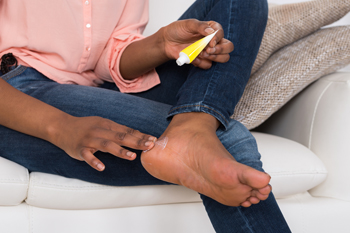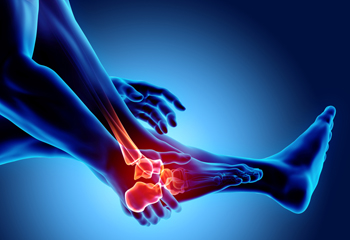Items filtered by date: February 2021
How Did I Get Plantar Fasciitis?
 Plantar fasciitis is a foot injury in which the plantar fascia, a ligament that runs along the bottom of the foot, becomes inflamed. This inflammation causes sharp, stabbing pain in the heel that is typically at its worst in the morning or when you rest after walking, running, or standing. Plantar fasciitis is often the result of overuse. Athletes and people who engage in excessive running, jogging, walking, or dancing are more likely to develop this condition. Other factors that increase your risk of getting plantar fasciitis include suddenly increasing your level of activity, having arthritis, obesity, having flat feet or high arches, and wearing shoes that do not fit properly. For more information about plantar fasciitis, please consult with a podiatrist.
Plantar fasciitis is a foot injury in which the plantar fascia, a ligament that runs along the bottom of the foot, becomes inflamed. This inflammation causes sharp, stabbing pain in the heel that is typically at its worst in the morning or when you rest after walking, running, or standing. Plantar fasciitis is often the result of overuse. Athletes and people who engage in excessive running, jogging, walking, or dancing are more likely to develop this condition. Other factors that increase your risk of getting plantar fasciitis include suddenly increasing your level of activity, having arthritis, obesity, having flat feet or high arches, and wearing shoes that do not fit properly. For more information about plantar fasciitis, please consult with a podiatrist.
Plantar fasciitis can be very painful and inconvenient. If you are experiencing heel pain or symptoms of plantar fasciitis, contact Dr. Joshua David Scoll from Pennsylvania. Our doctor can provide the care you need to keep you pain-free and on your feet.
What Is Plantar Fasciitis?
Plantar fasciitis is the inflammation of the thick band of tissue that runs along the bottom of your foot, known as the plantar fascia, and causes mild to severe heel pain.
What Causes Plantar Fasciitis?
- Excessive running
- Non-supportive shoes
- Overpronation
- Repeated stretching and tearing of the plantar fascia
How Can It Be Treated?
- Conservative measures – anti-inflammatories, ice packs, stretching exercises, physical therapy, orthotic devices
- Shockwave therapy – sound waves are sent to the affected area to facilitate healing and are usually used for chronic cases of plantar fasciitis
- Surgery – usually only used as a last resort when all else fails. The plantar fascia can be surgically detached from the heel
While very treatable, plantar fasciitis is definitely not something that should be ignored. Especially in severe cases, speaking to your doctor right away is highly recommended to avoid complications and severe heel pain. Your podiatrist can work with you to provide the appropriate treatment options tailored to your condition.
If you have any questions please feel free to contact one of our offices located in Philadelphia, Bensalem, and Fairless Hills, PA . We offer the newest diagnostic and treatment technologies for all your foot and ankle needs.
Plantar Warts Can Be Treated!
From Crawling to Walking
 Many people think babies' feet are smaller versions of their own adult feet, despite the fact that they go through a detailed developmental process. There are levels of growth in babies' feet. They start out crawling, and this phase can strengthen the feet by stretching the toes. As children start to walk, their feet become toned, and their soft cartilage begins to harden. It is beneficial to refrain from having your child wear shoes while walking indoors, as this can help to stretch the ligaments, tendons, and muscles that are found in each foot. The first pair of shoes should be worn when walking begins outside. It is important to monitor your child’s foot development and to be aware of any abnormalities if they appear. If you would like additional information about the stages of babies’ foot development, please consult with a podiatrist.
Many people think babies' feet are smaller versions of their own adult feet, despite the fact that they go through a detailed developmental process. There are levels of growth in babies' feet. They start out crawling, and this phase can strengthen the feet by stretching the toes. As children start to walk, their feet become toned, and their soft cartilage begins to harden. It is beneficial to refrain from having your child wear shoes while walking indoors, as this can help to stretch the ligaments, tendons, and muscles that are found in each foot. The first pair of shoes should be worn when walking begins outside. It is important to monitor your child’s foot development and to be aware of any abnormalities if they appear. If you would like additional information about the stages of babies’ foot development, please consult with a podiatrist.
Making sure that your children maintain good foot health is very important as they grow. If you have any questions, contact Dr. Joshua David Scoll of Pennsylvania. Our doctor can provide the care you need to keep you pain-free and on your feet.
Keeping Children's Feet Healthy
Having healthy feet during childhood can help prevent medical problems later in life, namely in the back and legs. As children grow, their feet require different types of care. Here are some things to consider...
Although babies do not walk yet, it is still very important to take care of their feet.
Avoid putting tight shoes or socks on his or her feet.
Allow the baby to stretch and kick his or her feet to feel comfortable.
As a toddler, kids are now on the move and begin to develop differently. At this age, toddlers are getting a feel for walking, so don’t be alarmed if your toddler is unsteady or ‘walks funny’.
As your child gets older, it is important to teach them how to take care of their feet.
Show them proper hygiene to prevent infections such as fungus.
Be watchful for any pain or injury.
Have all injuries checked by a doctor as soon as possible.
Comfortable, protective shoes should always be worn, especially at play.
If you have any questions please feel free to contact one of our offices located in Philadelphia, Bensalem, and Fairless Hills, PA . We offer the newest diagnostic and treatment technologies for all your foot and ankle needs.
Cracked Heels and Fissures
 Heel fissures often occur with cracked heels. Fissures are deep cracks in the skin of the heel that can cause severe pain and discomfort. They often develop as a result of standing on hard surfaces for the majority of the day or from wearing shoes that have an open back such as flip flops. Cracked heels can also form in the warmer months. Additionally, patients who have existing medical conditions such as psoriasis or eczema may be prone to developing cracked heels. The cracks will generally develop on the side of the heel, as daily activities are accomplished. Some patients find it helpful to soak their feet in warm water, followed by using a good moisturizer. Severely cracked heels can become infected, and it is strongly recommended that you consult with a podiatrist if you suffer from this condition.
Heel fissures often occur with cracked heels. Fissures are deep cracks in the skin of the heel that can cause severe pain and discomfort. They often develop as a result of standing on hard surfaces for the majority of the day or from wearing shoes that have an open back such as flip flops. Cracked heels can also form in the warmer months. Additionally, patients who have existing medical conditions such as psoriasis or eczema may be prone to developing cracked heels. The cracks will generally develop on the side of the heel, as daily activities are accomplished. Some patients find it helpful to soak their feet in warm water, followed by using a good moisturizer. Severely cracked heels can become infected, and it is strongly recommended that you consult with a podiatrist if you suffer from this condition.
If the skin on your feet starts to crack, you may want to see a podiatrist to find treatment. If you have any concerns, contact Dr. Joshua David Scoll from Pennsylvania. Our doctor can provide the care you need to keep you pain-free and on your feet.
Cracked Heels
It is important to moisturize your cracked heels in order to prevent pain, bleeding, and infection. The reason cracked heels form is because the skin on the foot is too dry to support the immense pressure placed on them. When the foot expands, the dry skin on the foot begins to split.
Ways to Help Heal Them
- Invest in a good foot cream
- Try Using Petroleum Jelly
- Ease up on Soaps
- Drink Plenty of Water
Ways to Prevent Cracked Heels
- Moisturize After Showering
- Skip a Shower
- Keep Shower Water Lukewarm
- Don’t Scrub Your Feet
If you are unsure how to proceed in treating cracked heels, seek guidance from a podiatrist. Your doctor will help you with any questions or information you may need.
If you have any questions, please feel free to contact one of our offices located in Philadelphia, Bensalem, and Fairless Hills, PA . We offer the newest diagnostic and treatment technologies for all your foot care needs.
Foot Stretches for Rheumatoid Arthritis
 Rheumatoid arthritis is an autoimmune disorder that causes pain, inflammation, stiffness, and swelling in joints throughout the body, including those in the feet. Stretching the feet regularly can help in managing the symptoms of rheumatoid arthritis. Toe lifts can be performed by standing with both feet on the ground near a counter or chair to steady yourself and then slowly lifting your toes off the ground, holding for several seconds, and lowering them back to the ground. Rolling a small ball side to side on the ground just under the front part of the heel can help ease foot pain. For more information about managing rheumatoid arthritis symptoms that affect your feet, please consult with a podiatrist.
Rheumatoid arthritis is an autoimmune disorder that causes pain, inflammation, stiffness, and swelling in joints throughout the body, including those in the feet. Stretching the feet regularly can help in managing the symptoms of rheumatoid arthritis. Toe lifts can be performed by standing with both feet on the ground near a counter or chair to steady yourself and then slowly lifting your toes off the ground, holding for several seconds, and lowering them back to the ground. Rolling a small ball side to side on the ground just under the front part of the heel can help ease foot pain. For more information about managing rheumatoid arthritis symptoms that affect your feet, please consult with a podiatrist.
Because RA affects more than just your joints, including the joints in your feet and ankles, it is important to seek early diagnosis from your podiatrist if you feel like the pain in your feet might be caused by RA. For more information, contact Dr. Joshua David Scoll of Pennsylvania. Our doctor will assist you with all of your podiatric concerns.
What Is Rheumatoid Arthritis?
Rheumatoid Arthritis (RA) is an autoimmune disorder in which the body’s own immune system attacks the membranes surrounding the joints. Inflammation of the lining and eventually the destruction of the joint’s cartilage and bone occur, causing severe pain and immobility.
Rheumatoid Arthritis of the Feet
Although RA usually attacks multiple bones and joints throughout the entire body, almost 90 percent of cases result in pain in the foot or ankle area.
Symptoms
- Swelling and pain in the feet
- Stiffness in the feet
- Pain on the ball or sole of feet
- Joint shift and deformation
Diagnosis
Quick diagnosis of RA in the feet is important so that the podiatrist can treat the area effectively. Your doctor will ask you about your medical history, occupation, and lifestyle to determine the origin of the condition. Rheumatoid Factor tests help to determine if someone is affected by the disease.
If you have any questions please feel free to contact one of our offices located in Philadelphia, Bensalem, and Fairless Hills, PA . We offer the newest diagnostic and treatment technologies for all your foot and ankle needs.

